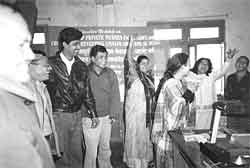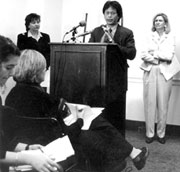 Abortion in Nepal is equated with infanticide and punishable by law-even if the pregnancy is a threat to the woman's life or is the result of rape. The result: six women die every day from unsafe abortions. Those who are caught can be punished with life sentences.
Abortion in Nepal is equated with infanticide and punishable by law-even if the pregnancy is a threat to the woman's life or is the result of rape. The result: six women die every day from unsafe abortions. Those who are caught can be punished with life sentences.
If the political parties keep their promises, Nepali women will be granted conditional abortion rights in the running 21st parliamentary session. Last October the Lower House took an historic step by voting to partially legalise abortion, but the Upper House said the Bill needed amendments, dismissing a historic chance for steps that could finally see the end of a leading killer of women here.
The proposal, which is part of a larger Bill on women's rights, was presented in the House as a finance bill in the last session, which means that this time around it does not need to go through the Upper House if the Lower House gives the go ahead. If this happens, abortion will be made legal if a woman requests it in the first 12 weeks of pregnancy, or within 18 weeks in cases of rape or incest, and when a woman's life or health is in danger or the foetus is impaired.
However, even if the Bill is passed, women's access to safe abortion services will still be threatened. Non governmental agencies which play a vital role in helping safeguard and improve the health of Nepali women, may find their hands are tied. Two years ago, US President George W Bush reinstated the 1984 Mexico City Policy (also called the Global Gag Rule) that prevents non-governmental organisations that are funded by the US government from campaigning for abortion reform a year after receiving funds, or providing abortion-related services, including counselling and referrals, even if the NGOs use other funds for that work.
But several Nepali organisations have publicly defied Bush. One of these is the Family Planning Association of Nepal (FPAN), the largest family planning NGO in the country, which has received US government funds for nearly 27 years. "My own government wants FPAN to help decriminalise abortion and make it safer," FPAN director general Dr Nirmal K Bista complained to the US Senate Foreign Relations Committee last July. "But the US government says \'No'." Urging the committee to overturn the ruling, Bista explained that if FPAN accepted its terms, "I would be prevented from speaking in my own country... about a healthcare crisis I know first-hand."
 Nepal has the fourth highest maternal death rate in the world: 539 women in 100,000 of reproductive age die from pregnancy-related complications each year as compared to seven in the United States. UN agencies estimate that 50 per cent of these women die from unsafe abortions. A recent hospital study in Kathmandu found that 20-60 per cent of all women admitted to obstetric and gynaecological wards suffered from critical post-abortion complications requiring blood transfusions and lengthy hospital stays-a crippling drain on the country's limited health resources and a financial burden on women and their families "Decriminalising and legalising abortion will definitely help reduce Nepal's high maternal mortality and morbidity rates," explains Bista. FPAN's principled decision has cost it approximately $250,000 in US funds and forced a cutback in services such as free contraceptive provision at its three clinics.
Nepal has the fourth highest maternal death rate in the world: 539 women in 100,000 of reproductive age die from pregnancy-related complications each year as compared to seven in the United States. UN agencies estimate that 50 per cent of these women die from unsafe abortions. A recent hospital study in Kathmandu found that 20-60 per cent of all women admitted to obstetric and gynaecological wards suffered from critical post-abortion complications requiring blood transfusions and lengthy hospital stays-a crippling drain on the country's limited health resources and a financial burden on women and their families "Decriminalising and legalising abortion will definitely help reduce Nepal's high maternal mortality and morbidity rates," explains Bista. FPAN's principled decision has cost it approximately $250,000 in US funds and forced a cutback in services such as free contraceptive provision at its three clinics.
This is why, even if the Bill is passed, Bush's dictate will continue to hinder its implementation. "The Global Gag Rule will [continue to] have a chilling effect as it will discourage NGOs receiving US funds from assisting the Ministry of Health in Safe Motherhood activities, such as public education and advocacy on the proposed abortion law," says Anand Tamang, director of the Centre for Research on Environment Health and Population Activities (CREHPA).
The centre, which also rejected strings-attached US funding, is part of a network of NGOs formed at the request of the Ministry of Health to advise the government on measures to save women from needless death and disability due to unsafe abortion. Surveys by CREHPA and others show that the majority of people from all sections of society and 74 per cent of lawmakers are in favour of legalising abortion. "Once it becomes law," says Dr Laxmi Raj Pathak, director of the government's Family Health Division, "the government's duty... includes making post abortion care accessible to as many women as possible." Already, providing emergency health care, particularly in remote mountainous regions, remains a problem. "Liberalising the abortion law is only the first step," warns rights campaigner Dr Aruna Uprety, noting that just 15 per cent of the population has access to hospitals.
For many women's rights activists, while the issue is at core about women's health, it also has serious social implications. Dr Durga Pokharel, chairperson of the newly formed National Women's Commission Dr. Durga Pokharel supports conditional legalisation of abortion. In her personal view, legalising abortion helps save lives, and also the social position of thousands of women across the country. In the case of pregnancy resulting from rape or incest, particularly among single young women, she says, "The present law further victimises unprotected women, and at the same time our lopsided definition of character-one for women, another for men-makes it impossible for a woman to live in this society if she abides by the law and decides to keep her foetus."
Better-off urban women can afford to pay Rs 7,000 to Rs 10,000 for an illegal-but relatively safe-abortion in the early stages of pregnancy at a private Kathmandu clinic. Bimala, a domestic help, had her pregnancy from her employer's son terminated in the seventh month at a private maternity hospital in the capital. Her employer paid Rs 30,000. Women like Bimala are lucky. Young and poor rural women are forced into the hands of quacks whose dangerous treatments-inserting sticks, shards of glass or cow dung into the vagina-can perforate organs and cause haemorrhaging, gangrene and sterility.
Those lucky to escape with their lives risk harsh prison sentences. A 1997 nationwide prison survey found nearly 100 women, one in five female prisoners, incarcerated for abortion. A study by the US-based Centre for Reproductive Law and Policy (CRLP) and Kathmandu's Forum for Women, Law and Development (FWLD) found that many such jailed women had no legal representation. An FWLD study report, scheduled to be made public later this month, is damming about the unbending attitude of the court judges all over Nepal on women facing charges of infanticide and abortion. A study covering the period from 1979-1999 found that 68 percent of women facing these charges were convicted, though in 75 percent of the cases, the judges used their discretionary power to reduce punishment on the grounds that the infanticide and abortion was done to avoid "social stigma".
 Even if a woman miscarries-a common occurrence in Nepal because of women's poor health and inadequate antenatal care-she may suffer the same fate. During her fifth month of pregnancy, while she was working in the fields to support her four children, 30-year-old Kumari went into premature labour. Village elders accused her of killing her child and reported her to the police. She was charged with infanticide and sentenced to 20 years imprisonment. Kumari did not undergo a medical examination. She did not have a lawyer nor was she informed about her right to legal representation. When she pleaded with the judge that she had not killed her baby, he said: "If you didn't, who did?"
Even if a woman miscarries-a common occurrence in Nepal because of women's poor health and inadequate antenatal care-she may suffer the same fate. During her fifth month of pregnancy, while she was working in the fields to support her four children, 30-year-old Kumari went into premature labour. Village elders accused her of killing her child and reported her to the police. She was charged with infanticide and sentenced to 20 years imprisonment. Kumari did not undergo a medical examination. She did not have a lawyer nor was she informed about her right to legal representation. When she pleaded with the judge that she had not killed her baby, he said: "If you didn't, who did?"
"Most women are poor, illiterate, and have no idea of the law," says Sapana Pradhan Malla, FWLD coordinator. The new FWLD shows that 60 percent of women in jail on charges of infanticide and abortion never went to school. One young woman sentenced under Nepal's abortion law, 16-year-old Min Min Lama, is now free. Sentenced for 20 years at the age of 13 for terminating a pregnancy after she was raped by a relative, the teenager was released in 1999, thanks to a national and international campaign. She now works with FPAN.
If our political leaders are to be believed, the Bill is close to their heart, and many have made sweeping promises in public. Prime Minister Sher Bahadur Deuba has put getting the Bill passed on his eight-point to-do list. Tara Nath Ranabhat, speaker of the Lower House, assured a delegation of women's rights activists at the start of the current session of parliament, which began on 10 February, that the Bill will be discussed and passed "within two weeks". Rajendra Kharel, Minister for Women and Social Welfare, as well as leader of the main opposition UML Madhav Kumar Nepal promised the full support of their respective parties during last week's International Women's Day celebrations. "While it is too soon to declare victory," cautions CRLP staff attorney Melissa Upreti, "It [the impending vote] is indeed an historic event, given that gender-based discriminatory provisions depriving women of even their most basic rights have existed in formal law in Nepal for almost 150 years."
(With additional reporting by Hemlata Rai.)


